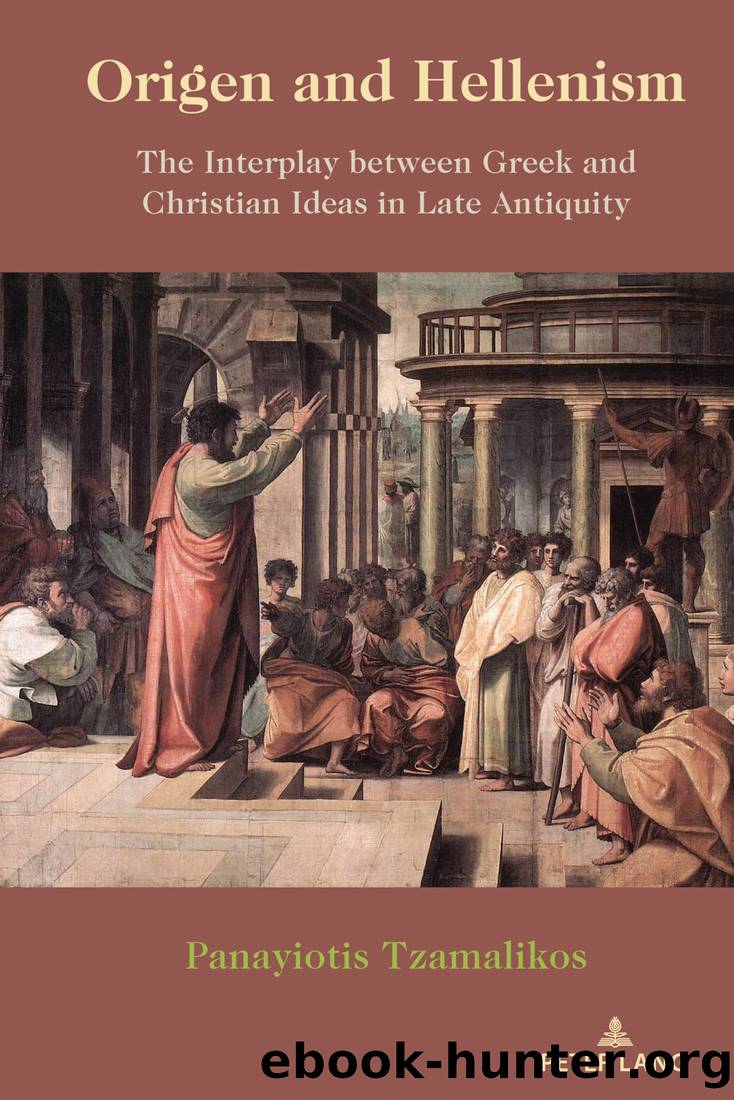Origen and Hellenism: The Interplay Between Greek and Christian Ideas in Late Antiquity by Panayiotis Tzamalikos

Author:Panayiotis Tzamalikos [Tzamalikos, Panayiotis]
Language: eng
Format: epub
ISBN: 9781433189173
Google: ZvdtzgEACAAJ
Publisher: Peter Lang
Published: 2022-05-09T20:43:38+00:00
â310 | 311â
4
Aetherial Bodies in Neoplatonism and Christianity
From Classical to Late Antiquity
In Late Antiquity, a perfervid discussion went on, especially among Neoplatonists, concerning an assumed astral or pneumatic or aetherial1 body, which the soul makes use of, assumed to serve either as a âvehicleâ of it or as a âvesselâ containing the soul itself. Michael Psellus and George Gemistus argued that the provenance of such ideas was Oriental, and originated from Zoroaster and the Persian Magi, as well as the Chaldean sages of Babylon.2
The Platonic tradition maintained that a âmanâ is identified with his âsoulâ. The most explicit statement positing this appears in Alcibiades i,3 which is now regarded by some as spurious, but the Late Antiquity treated it as a genuine work â311 | 312âof Plato, and both Proclus and Olympiodorus of Alexandria wrote commentaries on this. Otherwise, beyond the reference in the Alcibiades i (which was universally treated as Plato genuine work),4 Plato spoke âof the compound soul and body, which we call the living creature,â although he was referring to animals in general, not specifically to human beings.5 Nevertheless, Plato (or whoever wrote this Platonic treatise) dismissed the idea that âmanâ is a compound comprising body and soul; instead, he posited that âmanâ is the soul alone.6 On that account, the body (Ïῶμα) is only something the soul makes use of as an âorganâ; actually, this is a âtombâ (Ïá¿Î¼Î±) of it.7
This thesis was naturally endorsed by some Neoplatonists, namely, Proclus and Simplicius.8 Olympiodorus of Alexandria recorded the allegedly Platonic proposition âthe soul makes use of the bodyâ9 (which Aristotle criticised10), and when he came upon Plato identifying âmanâ with the soul, he showed no sign of dissent from this.11 Nevertheless, he took notice of Plotinusâ point,12 who allowed that âmanâ considered â312 | 313âas an âanimalâ is a compound, and drew a distinction between âour higher soulâ and âour lower soul, which is a sort of emanation from the higher soulâ.13 It should be recalled that Plotinus had added that, in a certain sense, we possess God and Intellect as being âoursâ, yet in fact these are transcendent to us.14 However, this was but a disguised endorsement of Aristotleâs ânous that comes from withoutâ (Ïá½»ÏαÏεν νοῦÏ), only to confirm Porphyryâs remark that the Enneads are stealthily full of Peripatetic and Stoic doctrines, and especially Aristotleâs Metaphysics is concentrated in them.â15 Thus, Plotinus argued that the soul is not in a body, no matter whether a âbodyâ is fancied as a receptacle (οὠμὴν οá½Î´â á½¡Ï á¼Î½ á¼Î³Î³Îµá½·á¿³) or as a place (á½¡Ï Ïá½¹ÏοÏ). For in either case the body per se is assumed to be lifeless.
Anyhow, Plotinus urged that a ânoble manâ (ÏÏÎ¿Ï Î´Î±á¿Î¿Ï) could not be considered as comprising body and soul16 (by which implicitly he endorsed the general view of Plato), but his ratiocination17 also made room for the idea that a âmean manâ, who is overtaken by âthe lower selfâ and has relinquished âthe higher selfâ, would be seen as a compound of body and soul.
Download
This site does not store any files on its server. We only index and link to content provided by other sites. Please contact the content providers to delete copyright contents if any and email us, we'll remove relevant links or contents immediately.
The remains of the day by Kazuo Ishiguro(8977)
Tools of Titans by Timothy Ferriss(8365)
Giovanni's Room by James Baldwin(7330)
The Black Swan by Nassim Nicholas Taleb(7109)
Inner Engineering: A Yogi's Guide to Joy by Sadhguru(6785)
The Way of Zen by Alan W. Watts(6601)
Asking the Right Questions: A Guide to Critical Thinking by M. Neil Browne & Stuart M. Keeley(5759)
The Power of Now: A Guide to Spiritual Enlightenment by Eckhart Tolle(5754)
The Six Wives Of Henry VIII (WOMEN IN HISTORY) by Fraser Antonia(5498)
Astrophysics for People in a Hurry by Neil DeGrasse Tyson(5182)
Housekeeping by Marilynne Robinson(4436)
12 Rules for Life by Jordan B. Peterson(4299)
Double Down (Diary of a Wimpy Kid Book 11) by Jeff Kinney(4261)
Ikigai by Héctor García & Francesc Miralles(4247)
The Ethical Slut by Janet W. Hardy(4242)
Skin in the Game by Nassim Nicholas Taleb(4239)
The Art of Happiness by The Dalai Lama(4125)
Skin in the Game: Hidden Asymmetries in Daily Life by Nassim Nicholas Taleb(3991)
Walking by Henry David Thoreau(3953)
